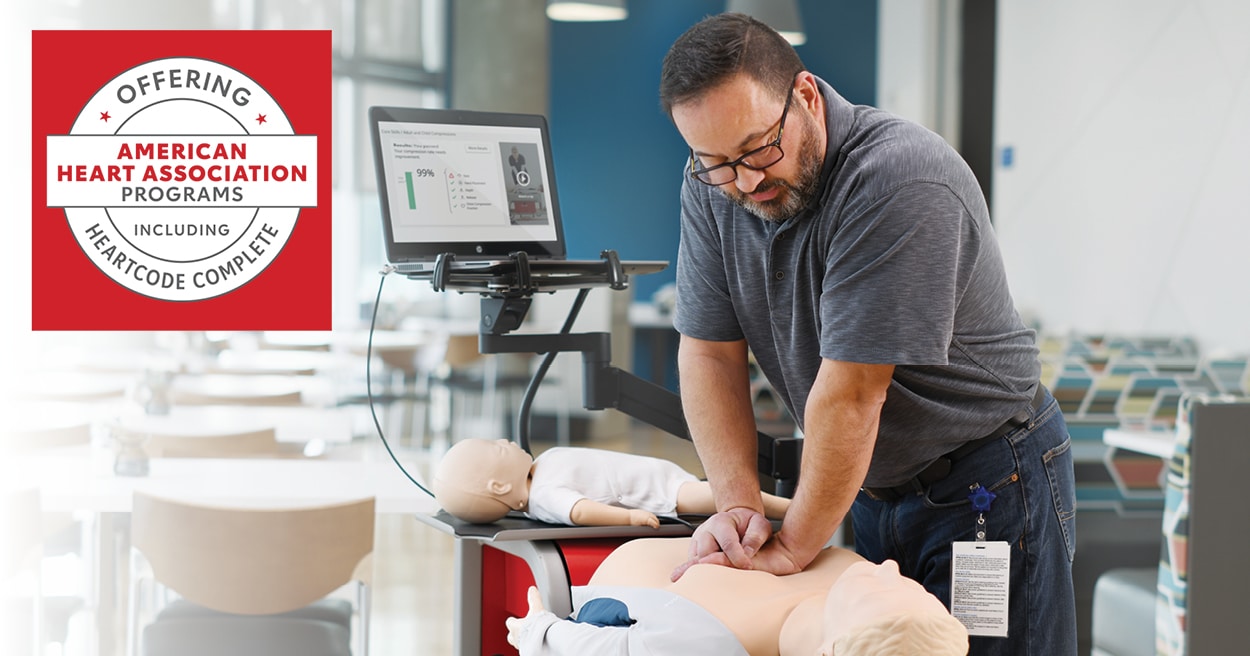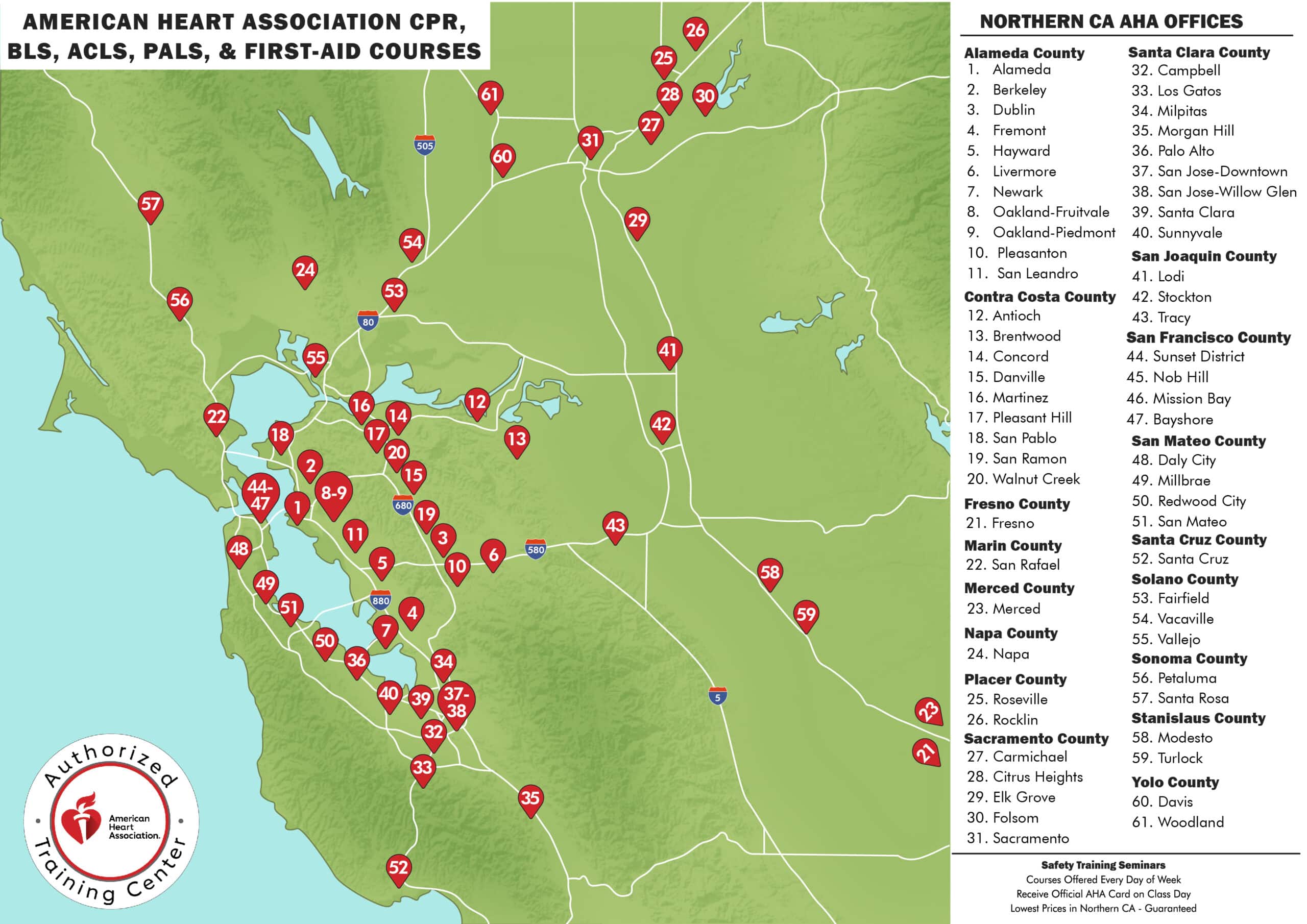American Heart Association© ACLS Certification Classes in Minnesota

Minnesota ACLS Renewal Courses
Course Name: ACLS Advanced Cardiac Life Support (Initial or Renewal)
Online Course Length: 3-4 hours (At your home.)
Skills Testing: 40 minutes (At one of our over 55 ACLS testing sites.)
Price: $290 (This includes the online ACLS course, skills testing, and card.)
Certification: American Heart Association© ACLS certification card.
When: ACLS classes are offered Monday – Sunday from 7 am to 6 pm
Card Issuance: You will receive the AHA ACLS card on the day of class.
Add ons: You can add on BLS, PALS, First-aid, or Bloodborne Pathogens
Low Price Guarantee: Lowest prices in Minnesota. Backed by price matching.
View ACLS Classes in Minnesota & Other Cities Near You
Store locator is loading from StoreRocket Store Locator App..

Advancing Cardiac Care: The Importance of American Heart Association ACLS Classes in Minnesota
Minnesota, a state known for its commitment to public health and safety, continues to uphold its reputation by offering accessible, high-quality training programs for healthcare providers and first responders. Among the most critical of these training programs are the American Heart Association (AHA) Advanced Cardiovascular Life Support (ACLS) classes. These classes equip medical professionals with the knowledge and skills required to respond to life-threatening cardiac emergencies, making a significant difference in patient outcomes.
In this article, we’ll explore the importance of AHA ACLS classes in Minnesota, how they are structured, their impact on healthcare, and how they contribute to creating a safer and more responsive healthcare system across the state.
Understanding the Importance of ACLS Classes
Sudden cardiac emergencies such as heart attacks, strokes, and cardiac arrest are leading causes of death in the United States. In Minnesota, like the rest of the country, cardiovascular diseases remain one of the leading health concerns. When a person experiences a cardiac emergency, immediate and highly skilled intervention is crucial to improve their chances of survival. ACLS training is designed to ensure that healthcare providers and emergency personnel are equipped to handle these critical situations effectively.
ACLS goes beyond Basic Life Support (BLS) by focusing on the advanced techniques needed to manage cardiac emergencies in more complex settings. Participants in ACLS classes learn not only how to perform CPR and use an automated external defibrillator (AED), but also how to interpret electrocardiograms (ECGs), manage airway obstruction, administer life-saving medications, and handle post-resuscitation care. These advanced skills are essential for healthcare professionals working in emergency rooms, intensive care units, and other high-stakes environments where lives are on the line.
The Role of American Heart Association ACLS Classes
The American Heart Association ACLS classes are designed to teach healthcare providers how to respond quickly and accurately to cardiac emergencies. The curriculum covers several critical components, including:
Recognition and Management of Cardiac Arrest and Stroke: ACLS training teaches participants how to quickly recognize the signs of life-threatening cardiac and neurological events. This includes identifying the different types of heart arrhythmias that may require defibrillation or medication, as well as recognizing the symptoms of a stroke to ensure rapid intervention.
Airway Management: Proper airway management is vital for patients who are experiencing respiratory failure or cardiac arrest. ACLS classes teach advanced airway techniques such as intubation, as well as non-invasive methods like using bag-valve masks to ensure adequate ventilation.
Pharmacology in Cardiac Care: ACLS providers must be able to administer and understand the effects of medications that are used during cardiac arrest, arrhythmias, or other life-threatening conditions. This includes drugs like epinephrine, amiodarone, atropine, and vasopressors, which are integral to ACLS protocols.
Team Dynamics and Communication: In critical care scenarios, teamwork and communication are crucial for effective patient management. ACLS training emphasizes the importance of working as a cohesive team during resuscitation efforts, teaching participants how to assign roles, communicate effectively, and implement ACLS algorithms in a fast-paced environment.
Post-Cardiac Arrest Care: The ACLS course also covers care for patients who have been successfully resuscitated. This includes managing patients in the intensive care unit (ICU) and implementing strategies that can help improve the chances of neurological recovery after cardiac arrest.
These essential skills form the foundation of effective cardiac emergency care and are vital for healthcare providers in Minnesota who regularly encounter patients in critical conditions.
Accessibility of ACLS Classes in Minnesota
Minnesota is home to numerous hospitals, clinics, and medical institutions that emphasize the importance of continuing education and advanced training for healthcare professionals. AHA ACLS classes are widely available across the state, ensuring that healthcare workers, whether in urban centers like Minneapolis and St. Paul or in rural communities, have access to this critical training.
The AHA offers both in-person and blended learning options for ACLS certification. The blended learning model allows participants to complete the theoretical portions of the course online at their own pace, followed by an in-person skills session where they practice hands-on techniques, work through case scenarios, and receive feedback from certified instructors. This flexibility makes it easier for busy healthcare professionals to fit ACLS training into their schedules without compromising on the quality of the learning experience.
Many hospitals in Minnesota, including the Mayo Clinic, Hennepin Healthcare, and the University of Minnesota Medical Center, regularly host ACLS training sessions for their staff. In addition, local fire departments, EMS agencies, and medical training centers across the state offer ACLS classes to paramedics, nurses, doctors, and other healthcare providers. The goal is to ensure that all medical personnel who are involved in patient care are prepared to handle cardiac emergencies with confidence and expertise.
Tailored Training for Minnesota’s Diverse Healthcare Needs
Minnesota’s healthcare landscape is diverse, with large academic medical centers, community hospitals, and rural clinics spread across the state. AHA ACLS classes are designed to meet the specific needs of healthcare professionals working in various environments.
In urban settings, where hospitals often handle a high volume of cardiac emergencies, ACLS training focuses on rapid, protocol-driven responses to cardiac arrest and stroke. In rural areas, where access to specialized care may be limited, ACLS training emphasizes the importance of stabilizing patients for transport and ensuring effective care while awaiting more advanced interventions. Regardless of the setting, ACLS training ensures that healthcare providers have the skills needed to respond quickly and effectively to save lives.
Building Confidence and Preparedness in Healthcare Providers
One of the most important outcomes of ACLS training is the confidence it instills in healthcare providers. Cardiac emergencies are often chaotic, high-pressure situations where every second counts. ACLS training not only equips participants with the technical skills needed to perform lifesaving procedures but also helps them develop the mental readiness to act decisively in critical moments.
In Minnesota’s hospitals and healthcare facilities, ACLS-certified professionals are often the first line of defense in cardiac emergencies. By mastering ACLS protocols, these professionals can ensure that they provide the highest level of care possible, improving patient outcomes and enhancing the overall quality of cardiac care in the state.
Making a Difference in Minnesota’s Healthcare System
The widespread availability of ACLS training has a direct impact on patient care and survival rates in Minnesota. Healthcare providers who are trained in ACLS protocols are better equipped to respond to cardiac emergencies, increasing the likelihood of successful resuscitation and recovery. This not only benefits individual patients but also strengthens the overall healthcare system by reducing the strain on emergency departments and improving long-term patient outcomes.
For Minnesota residents, knowing that their local hospitals and clinics have highly trained staff who can respond to cardiac emergencies brings peace of mind. Whether it’s in a bustling urban ER or a quiet rural clinic, ACLS-certified professionals are making a difference in communities across the state.
Conclusion: Elevating Cardiac Care in Minnesota Through ACLS Training
The American Heart Association ACLS classes play a pivotal role in advancing cardiac care in Minnesota. By providing healthcare professionals with the advanced skills needed to respond to life-threatening emergencies, these classes contribute to better patient outcomes and a more responsive healthcare system. With accessible training options throughout the state, more and more Minnesota healthcare providers are gaining the expertise they need to save lives.
As Minnesota continues to prioritize public health and emergency preparedness, the importance of ACLS training cannot be overstated. Whether you’re a paramedic, nurse, or physician, ACLS certification is an invaluable tool that empowers you to make a difference in the most critical moments of a patient’s life.
FAQs
Who can benefit from ACLS classes in Minnesota?
ACLS classes are primarily designed for healthcare professionals, including physicians, nurses, paramedics, and other allied healthcare providers who are involved in the management of cardiac emergencies.
How long does it take to complete ACLS certification training?
The duration of ACLS certification training varies depending on the specific course provider and format. Typically, ACLS certification courses consist of both didactic instruction and hands-on skills practice and can range from one to two days.
Is ACLS certification recognized nationwide?
Yes, ACLS certification obtained in Minnesota is recognized nationwide and is widely accepted by healthcare organizations, employers, and regulatory bodies across the United States.
